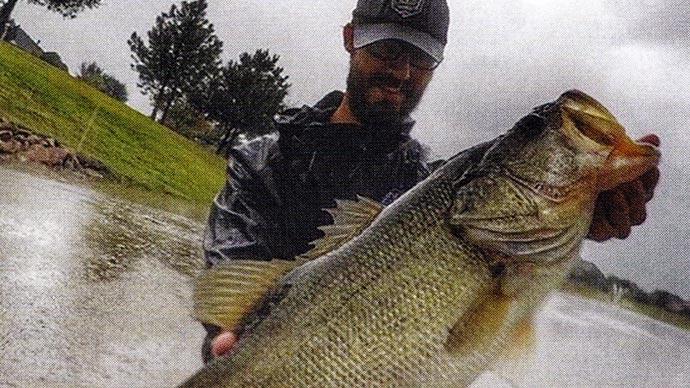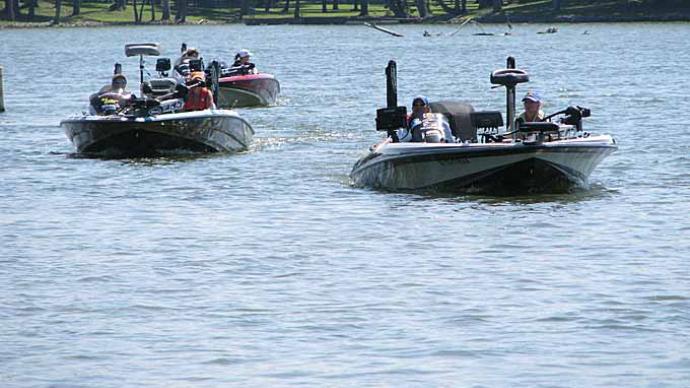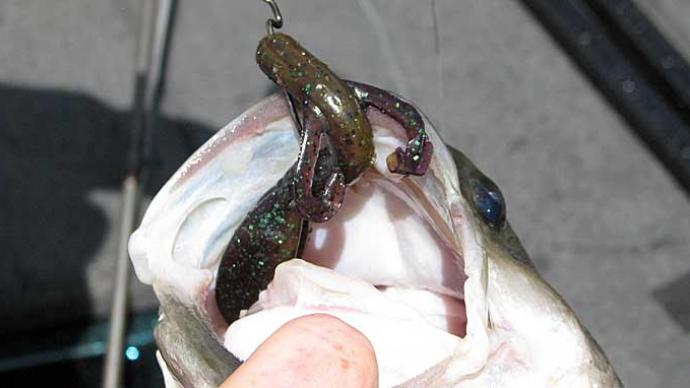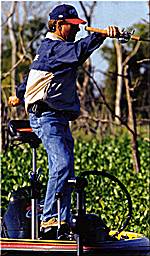
Browse through the records of professional bass fishing, and you'll see the names of anglers who have claimed victories with tenacious regularity. First, there was the domination of Bill Dance in the late 1960s, followed soon after by Roland Martin. The list of notables has grown considerably over the decades, and names such as Clunn, Nixon, Brauer, Fritts, VanDam, and others have become synonymous with excellence.
Nothing generates more electricity in competitive fishing than an angler who gets on a roll and claims a mound of cash and several victories in quick succession. During the 1980-1981 season, Roland Martin did the unthinkable by winning consecutive tournaments on Okeechobee, Toledo Bend, and Lake Eufaula. Of all the high marks of Martin's fabled career, this triple may be his most stunning accomplishment.
A hot streak does more than put an angler in the limelight and fatten his bank account. It galvanizes attention and attracts interest from those out of touch with the world of competitive fishing.
Even more important, hot streaks legitimize our sport. Some detractors believe anyone who wins a fishing tournament is merely luckier than his competitors. But that theory doesn't wash when one angler dominates a long and arduous fishing season. A hot streak is proof positive that the top professional anglers perform with utmost skill and savvy. Simply put: nobody is that lucky.
Consider Denny Brauer, who won FLW Tour Angler of the Year in 1998. It was the culmination of what many consider the most impressive hot streak in professional bass fishing history. En route to nabbing many high finishes and wins in tournaments across the country, Brauer amassed more than half a million dollars in cash and prizes in a single tournament season.
When Brauer became the first angler ever to grace the cover of a cereal box for winning the FLW Tour Angler of the Year title, his performance with rod and reel demonstrated that he aptly deserved such high recognition. At that moment, competitive bass fishing took a giant step into the consciousness of mainstream America.
What separates anglers who ride hot streaks to fame and big bucks from most bass fishermen who catch fish in haphazard anonymity? What can you do to increase your odds of creating hot streaks that establish your name among fishing's elite?
If the answers to such questions were obvious, everybody would be a winner. Talk to those who have been swept away by a hot streak, and they'll tell you it's a mental state where the conscious and subconscious work together in harmony to create uncanny decision-making and absolute confidence.
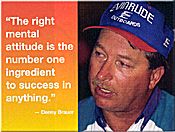
"The right mental attitude is the number one ingredient to success in anything," Brauer slays. "When you're fishing at a high level, you get in a frame of mind where most of your decisions are correct, and you don't question your decisions. You go with your gut and stick with it. You're willing to gamble on defeat to go for the win."
Brauer often takes risks by suddenly switching gears, such as fishing water he's never seen before, a bold move that has both made him a hero and proved disastrous. After jigging a rocky bank for two days during an FLW tournament on Kentucky Lake, Brauer made the first cut to 10 anglers. But he didn't believe his area would produce enough fish for him the next day to advance to the finals.
So, on day three, Brauer made a Kamikaze run across a shallow flat to reach deeper water behind it that he had never seen before. There he caught enough bass flipping to wood cover to make his way to the final five. On the event's last day, the camera boat got stuck on the mud flat as it followed Brauer back out.
"That just as easily could have been me," says Brauer of the camera boat. "Believe me, those kinds of gambles don't always work out. But I wouldn't have made the finals if I hadn't gambled on crossing that flat."
Brauer acknowledges that his years of tournament experience give him an edge. His knowledge pays off when he's on the water competing. In other words, his subconscious mind takes in the conditions and often urges him to change for a reason, even if he doesn't fully understand.
"I think that separates truly great anglers from the rest of the pack," says Brauer. "They'll spontaneously change a lure or move to a new location and not know why. But somewhere in their minds, there's a connection to an identical situation that took place in the past. The answer often comes as a feeling rather than through deductive reasoning."
Anglers who latch onto hot streaks also spend long hours preparing for tournaments. And on practice days, they're generally the first to leave the boat ramp in the morning and the last to return in the evening. In short, they work their tails off.
Experience helps them locate bass and tells them which areas are likely to receive the most fishing pressure. Given the strong skills most tournament anglers possess these days, few productive areas are overlooked. The tournament strategy must account for fishing pressure and the number and quality of bass available in given areas.
Most elite anglers favor particular fishing conditions and techniques, but all are versatile enough to adapt to whatever confronts them. The key to winning tournaments is to fish well enough on the initial days to put yourself in a position to win on the final day.
"A lot of people think I'm only capable with a flipping rod," Brauer says, "but you have to do whatever it takes at that moment to catch fish. Versatility puts you in a position to win, but your strong suit usually pulls it out for you."
Michigan's Kevin VanDam, whose entire career could be regarded as a continuous hot streak, is a serious student of the game. He observes how other top anglers handle themselves on the water and what they do to put themselves in the winner's circle. By emulating these anglers, VanDam has become a more aggressive fisherman.
"Early in my career," VanDam says, "I was much more conservative. I'd always catch my limit and maybe go after the big ones. I learned from watching Denny Brauer that I needed to take more chances. Now, I'm more inclined to make bold moves and go for it at the end of a tournament. Most of the time, you fail. But every now and then, you win or jump up maybe 15 places in the standings."
The "gutsy moves" of which VanDam speaks are not whimsy. He would never change strategies just for the sake of doing something different. Instead, his moves are educated guesses based on past experience, knowledge of the lake, and what he learned during the competition's initial days. The tournament format also plays into the decision. When fishing in an elimination tournament, such as FLW Tour events, VanDam avoids heavily fished areas during the initial days.
"If you get through the qualifying rounds," VanDam says, "you're only fishing against a handful of anglers as opposed to a large field. That's when I'll sometimes head straight for those areas that had received heavy fishing pressure early on. Even though those areas may have been hammered, they can give up some good bass when the pressure's off.
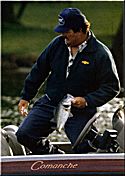
In other instances, VanDam may change tactics that he feels will produce better quality fish, such as switching from a spinnerbait to a jig or exchanging a small spinnerbait for a large crankbait.
Hot streaks are also more likely for some anglers when tournament waters lend themselves to particular fishing methods. High, murky water and lakes that produce quality bass in the shallows give Brauer and his flipping rod a decided advantage. Low, clear water and bass holding on structure are tailor-made for crankbait expert David Fritts, who is no stranger to hot streaks.
During one hot streak in 1997, Fritts won three FLW events, including the championship. His combined winnings that year totaled $490,000 in cash and prizes. As you may suspect, 1997 was a good year for crankbaits. Though he is acknowledged by many of his peers as the best structure fisherman in professional bass fishing, Fritts claims that luck plays a role in any hot streak.
"When you're whisked away by a hot streak," Fritts says, "it's almost like you can't get off. Every decision you make seems to be the right one. You catch fish no matter which side of the boat you throw from, and you land fish you should never have caught."
During hot streaks, even heavy-weight bass lightly hooked by a treble hook manage to find their way into Fritts' live well. In one tournament on Lake Eufaula, in which Fritts finished second, a bass inhaled his crankbait and hopelessly wrapped the 10-pound test line around the limbs of a flooded, standing tree. Fritts dropped his plug knocker into the water, caught the free end of the line leading to the bass, and hand-lined in a 9-pound, 2-ounce largemouth. It turned out to be the Big Bass of the day.
Fritts can entertain you for hours with similar stories in which luck worked to his advantage. You need at least a modicum of luck to stay astride a hot streak, but catching a hot streak mainly stems from hard work, experience, and the courage to take when you're in a position to win.
Content provided by Bass Fishing Magazine, the official publication of FLW Outdoors

